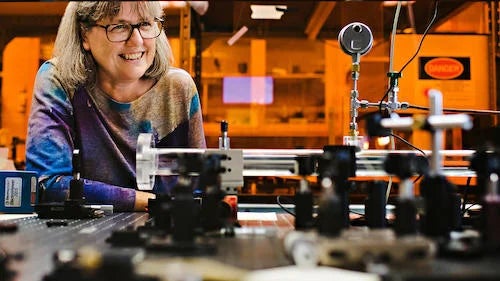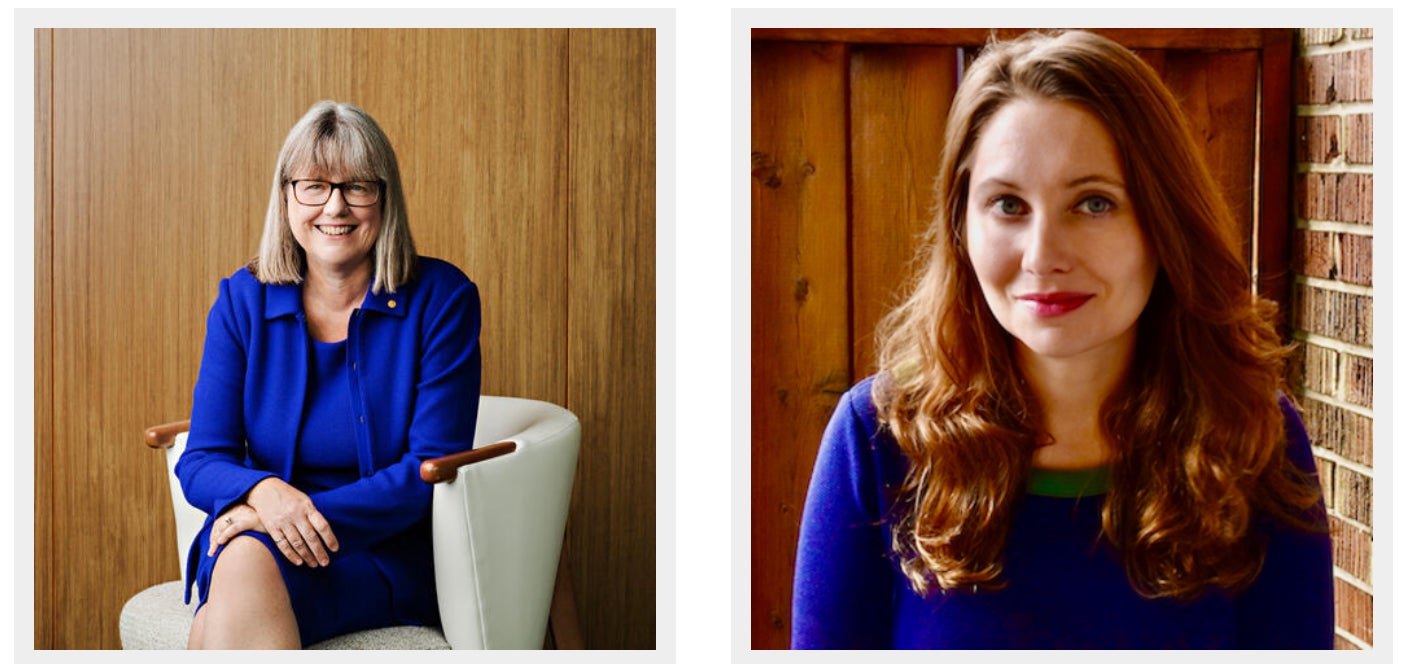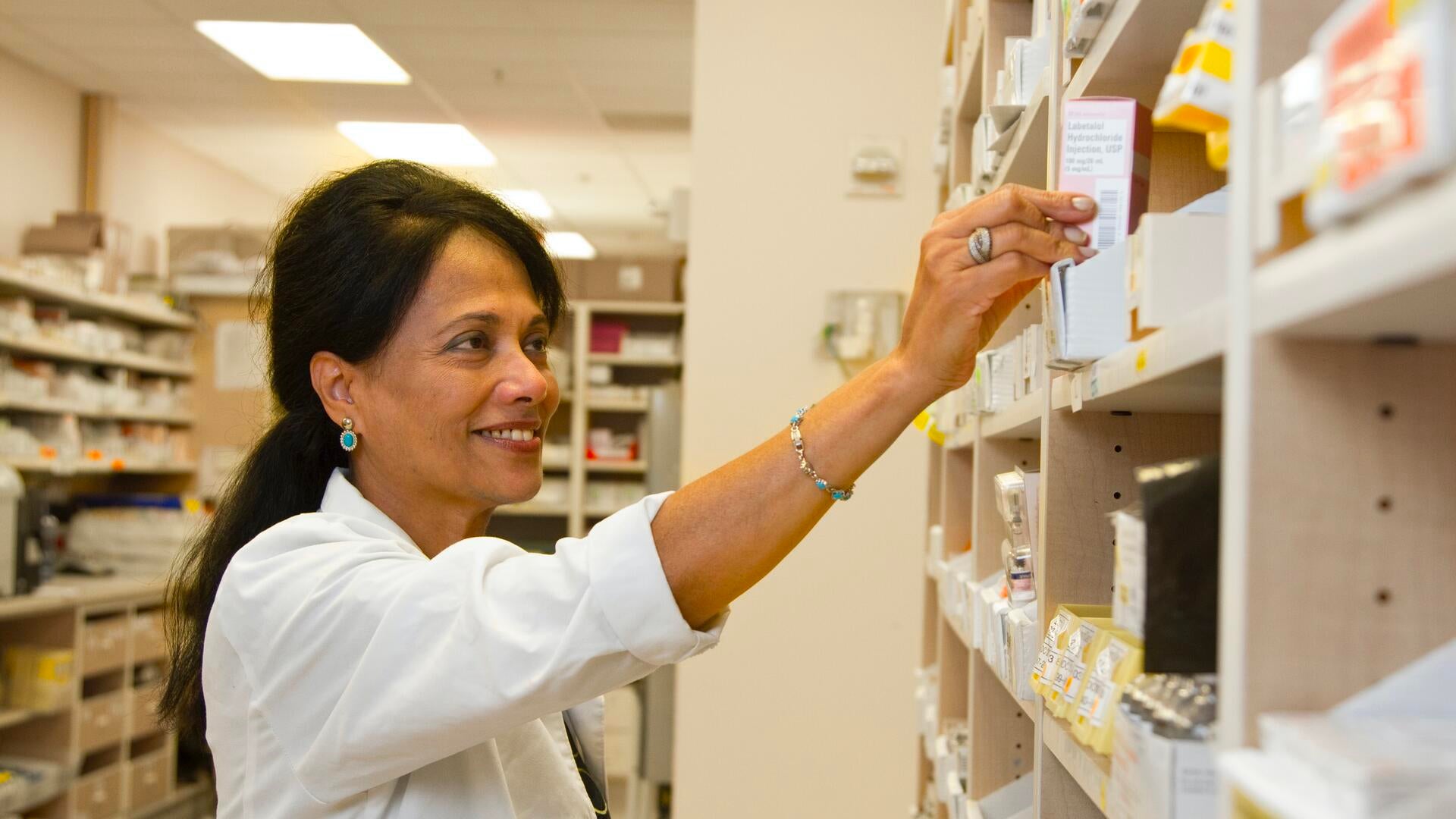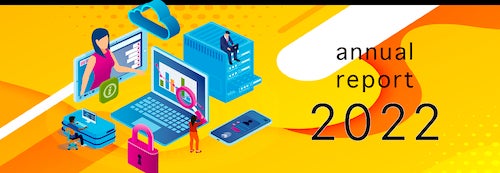- Masks strongly recommended, but optional for winter term
- Nobel laureate launches the Trust in Science and Technology Research Network at Waterloo
- New app idea helps pharmacists quickly connect with patients for prescription needs
- IST's annual report celebrates 2022 achievements
- What's the haps on campus as the term begins
Editor:
Brandon Sweet
University Communications
bulletin@uwaterloo.ca
Masks strongly recommended, but optional for winter term

As winter term lectures and classes start today, the president and provost circulated an update to the campus community about facial coverings.
"As exams ended in December, we committed to let you know what our approach to masking for the winter term would be before classes start on January 9," wrote Vivek Goel, President and Vice-Chancellor and James Rush, Vice-President, Academic & Provost in a memo circulated to campus on Thursday last week. "While COVID-19, influenza and other respiratory illnesses continue to circulate in our community, there is now less risk of disruption to our academic activities so a mask requirement will not continue. However, given the ongoing impact of these conditions for members of our community, we strongly encourage you to think of the people around you and help limit the spread of COVID by wearing a mask in indoor settings this term."
"The decision to wear a mask this term will be optional but, as always, we will not hesitate to bring back a requirement to wear masks if the situation requires it at any point during the term," the president and provost write. "Wearing a mask is an easy way to protect yourself and the people around you against most airborne diseases. When you are in close contact with others, we strongly recommend you consider wearing a tight-fitting, multi-layer mask. A medical-style mask is best. Please also ensure you follow basic personal hygiene practises like washing your hands frequently to help avoid spreading diseases."
"Maintaining up-to date vaccinations for COVID-19 and influenza remain the most important protective measures you can take."
"We’ll continue to make masks available for pick up on campus. You can check the COVID-19 information website for more information on mask pick up. We are confident that everyone in the Waterloo community will continue to do what is necessary to stay safe and to protect each other. Most of all, we ask you to respect people’s choices and work together to make our campuses inviting and friendly."
"As always, information about COVID-19 and our health and safety measures are available on the COVID-19 information website," the president and provost's memo concludes.
Nobel laureate launches the Trust in Science and Technology Research Network at Waterloo

By Stephanie Longeway. This article was originally published on Waterloo News.
The spread of disinformation and misinformation — often fuelled by skepticism — is on the rise. Combating this trend and understanding why some people deny, doubt or resist scientific findings and explanations is crucial to addressing the complex and existential issues impacting our societies.
The University of Waterloo’s new Trust in Science and Technology Research Network brings together researchers and practitioners from across disciplines to improve communication with the public and build trust in science and technology. Under the leadership of the inaugural co-directors, Dr. Donna Strickland, recipient of the 2018 Nobel Prize in Physics, and Dr. Ashley Rose Mehlenbacher, Canada Research Chair in Science, Health and Technology Communication, it is the first multidisciplinary research network of its kind in Canada to tackle this important issue.

Dr. Donna Strickland and Dr. Ashley Rose Mehlenbacher.
“The COVID-19 pandemic illustrated the difficulties and deadly consequences of science denial. Similarly, the effects of the climate crisis we’re facing remain unabated and yet some still deny its existence or the impacts it is having on our world,” says Strickland, professor in the Department of Physics and Astronomy. “Stronger scientific literacy and understanding can help to address some of the misinformation, but this issue is bigger than just a knowledge gap and requires a multidisciplinary solution. Our research network is a collaboration across science, engineering, philosophy, psychology, and rhetoric and communication studies to get to the root causes.”
The Trust in Science and Technology Research Network plans to begin engagement with the public through an expert speaker series and a Citizen Science Project where Waterloo region community members can offer input and actively participate in the scientific research communication process.
“It is important that we engage authentically with members of the community through events and activities to get to the core of what information the public needs and values,” says Mehlenbacher, professor in the Department of English Language and Literature. “A common theme I have encountered in my work in science communications is the importance of trust when we talk about big issues that impact us all. We need to move beyond a broadcast model of translating knowledge and focus on building trust with people to help inform their decisions around complex scientific topics.”
The research network is also collaborating with fellow researchers in the faculties of Arts, Engineering, Environment and Science to begin building and sharing resources to support faculty who conduct public engagement and communication work. In the long term, the research network plans to expand its partnerships further to include all Waterloo faculties as well as external partners including provincial and national organizations.
“The research network will develop mechanisms to enhance trust in science and technology with a broad range of stakeholders,” says Dr. Mary Wells, dean of the Faculty of Engineering and one of the founding members of the research network. “Building trust and understanding of science and technology will allow researchers and scholars to communicate, mobilize and share knowledge with the public, policymakers, politicians, industry leaders and others.”
Additional founding members of the network include Dr. Jonathan Fugelsang, professor of Psychology, Dr. Carla Fehr, professor of Philosophy and the Wolfe Chair in Scientific and Technological Literacy, and Dr. Christine Dow, professor of Geography and Environmental Management and Canada Research Chair in Glacier Hydrology and Ice Dynamics. Seed funding for the Trust in Science and Technology Research Network was provided through the University of Waterloo’s Interdisciplinary Networks, Programs and Initiatives Fund.
New app idea helps pharmacists quickly connect with patients for prescription needs

By Milana Madzarac.
The Pharmasave Business Competition awards a third-year Waterloo School of Pharmacy student team a $5,000 prize for an innovative business model in the field of pharmacy.
“Every year, the Pharmasave Business Competition proves pharmacists can be entrepreneurs. Our course and the competition are unique to the School and provide students with the opportunity to practice the skills of entrepreneurship while interacting with the robust start-up ecosystem in our community,” says Dean Pacey, professor at the School of Pharmacy.
Students work in teams to develop a startup that solves a current health care issue aligned with Ontario health care regulations. Students pitch their ideas to a panel of pharmacists, entrepreneurs and financial advisors.
The winning team — Iryna Zhyrnova, Amanda Nicole Helka and Alli Meyer — took the title with their business, URinCharge. The team focused on connecting patients and pharmacists to solve urgent women’s health issues.
With the new minor ailments regulations in place, patients can now visit a pharmacist for prescriptions that fall within the 13 minor ailments.
However, minor ailment prescribing is voluntary for pharmacists and only those certified and participating can prescribe medications. Finding participating pharmacists to solve immediate needs remains an issue.
The teams’ app, using GPS location, allows a person experiencing UTI symptoms to connect with a pharmacy of their choice to book an appointment within two hours. The app lists all pharmacies that report they have available appointments to give the patient the option to choose which location and time works best for them.
“Technology is growing exponentially and there seems to be an app for everything on the market. Digital connection is becoming a normal part of everyday life — why not apply an app to something that can help people take charge of their health,” Zhyrnova says.
Once the app matches the user with a pharmacy the patient will receive either a referral to a physician or their prescribed medication, depending on their situation. If the consultation results in a prescription, the patient can then choose their preferred pharmacy to fulfill the prescription.
“Our goal is to help people experiencing UTIs, typically women, get access to care in a way that won’t force them to take time off work and impact their life,” Helka says.
Winning the competition reassured the team that their idea has strong potential for real-world application. With the health care landscape changing, innovative ideas will play a significant role in ensuring a sustainable health-care system."If the last two to three years has taught us anything, it is that the Canadian health care landscape will continue to face disruptive change in the coming decades. This will create tremendous opportunities for innovation and solutions-oriented ideas, both within traditional pharmacy settings and in non-traditional role,” Pacey says.
The team surveyed a group of pharmacists in Ontario to demo the project and provide feedback. “It was amazing to see pharmacists excited about the potential of our idea,” Meyer says.
The team will use the prize money to develop the app with the software engineer and app developer they have been consulting with.
“This project was close to our hearts,” Zhyrnova says. “Historically, women’s health has been understudied and excluded from clinical trials. Side effects can linger and metabolize differently with pain varying from woman to woman. It’s so important to advocate for the profession of pharmacy and women.”
The competition funded by Pharmasave is held annually and has led to at least three real-world businesses.
IST's annual report celebrates 2022 achievements

A message from Bruce Campbell, Chief Information Officer, Information Systems & Technology.
Information Systems & Technology's (IST) is pleased to announce its 2022 Annual Report. This report highlights a number of achievements from the past year and their impact on various areas of campus. The stories we’ve chosen show ‘IT’ is not just about technology and systems but supporting and engaging our community in their work and study. I hope you find the report both informative and fun to read. Thank you for your partnership, and for helping us deliver state of the art, people-centric IT services and solutions in support of the University mission.
Visit the IST Annual Report site at https://uwaterloo.ca/ist-annual-report. Review our other 2022 accomplishments or take a look at our planned 2023 initiatives.
What's the haps on campus as the term begins
Lectures, classes, and the co-operative work term all kick off today as students return to campus for winter 2023.
The Dana Porter and Davis Centre Library branches are open 8:00 a.m to 5:00 p.m. Library Drop-Ins are back in the Dana Porter Library for Tuesdays and Thursdays in the winter term between 12 noon and 6:00 p.m.
Athletics facilities, including PAC, CIF and Field House, are open 6:30 a.m. to 12:30 a.m. Monday to Friday, with reduced hours on Saturdays and Sundays.
Food Services operations are up and running at full strength this week.
W Store South Campus Hall will be open 9:00 a.m. to 6:00 p.m. from Monday, January 9 to Thursday, January 12, Friday, January 13 from 9:00 a.m. to 5:00 p.m. and Saturday, January 14 from 9:00 a.m. to 5:00 p.m. W Store Essentials Mathematics and Computers will be open weekdays from 9:00 a.m to 5:00 p.m., as will W Print South Campus Hall. W Print General Services Complex will be open weekdays from 8:30 a.m. to 4:00 p.m.
Campus tours have resumed at the Visitors Centre.
The Society of Pharmacy Students will be hosting its annual Phrosh Week this week for the winter term's incoming pharmacy cohort. First year pharmacy students take part in team building events to meet their peers and foster friendships for the four years to follow. WUSA's termly Welcome Week activities kick off next week.
Link of the day
25 years ago: Titanic proves unsinkable at the box office
When and Where to get support
Students can visit the Student Success Office online for supports including academic development, international student resources, immigration consulting, leadership development, exchange and study abroad, and opportunities to get involved.
Instructors looking for targeted support for developing online components for blended learning courses, transitioning remote to fully online courses, revising current online courses, and more please visit Agile Development | Centre for Extended Learning | University of Waterloo (uwaterloo.ca).
Faculty, staff, post-doc and graduate student instructors can find upcoming teaching and learning workshops, self-directed modules and recordings of previous events on Centre for Teaching Excellence Workshops and Events page.
Instructors can access the EdTech Hub to find support on Waterloo’s centrally supported EdTech tools. The Hub is supported by members of IST’s Instructional Technologies and Media Services, Centre for Teaching Excellence, Centre for Extended Learning and subject matter experts from other campus areas.
Supports are available for employees returning to campus. Visit IST’s Hybrid Work and Technology guidelines and workplace protocols to assist with the transition.
Students with permanent, temporary and suspected disabilities and disabling conditions (medical conditions, injuries, or trauma from discrimination, violence, or oppression) can register with AccessAbility Services for academic accommodations (classroom accommodations, testing accommodations, milestone accommodations).
Instructors can visit AccessAbility Services' Faculty and Staff web page for information about the Instructor/Faculty role in the accommodation process. Instructors/Faculty members are legally required to accommodate students with disabilities. AccessAbility Services (AAS) is here to help you understand your obligations, and to offer services and resources to help you facilitate accommodations.
The Writing and Communication Centre has in-person and virtual services to support grad and undergrad students, postdocs and faculty with any writing or communication project. Services include one-to-one appointments, drop-ins at Dana Porter Library, online workshops, writing groups, English conversation practice, and custom in-class workshops.
Research Ethics: Find yourself with an ethical question, unsure if your work requires an ethics review, or need advice about putting together a research ethics application? Reach out to one of our friendly staff by booking a consultation or email us with your questions.
Co-op students can get help finding a job and find supports to successfully work remotely, develop new skills, access wellness and career information, and contact a co-op or career advisor.
The Centre for Career Action (CCA) has services and programs to support undergrads, grad students, postdocs, alumni, and employees in figuring out what they value, what they’re good at, and how to access meaningful work, co-op, volunteer, or graduate/professional school opportunities. Questions about CCA's services? Live chat, call 519-888-4047, or stop by our front desk in the Tatham Centre 8:30 a.m. to 4:30 p.m., Monday to Friday.
Drop-in to in-person Warrior Study Halls on Thursdays from 5:00 p.m. to 6:30 p.m. in DC and DP. Join a Peer Success Coach to set goals and work independently or in groups each week.
Renison's English Language Institute continues to offer virtual events and workshops to help students practice their English language skills.
If you feel overwhelmed or anxious and need to talk to somebody, please contact the University’s Campus Wellness services, either Health Services or Counselling Services. You can also contact the University's Centre for Mental Health Research and Treatment. Good2Talk is a post-secondary student helpline available to all students.
The Library is here to help, both in person and online. Our spaces are open for access to book stacks, study space, computers and printers, and the IST Help Desk. For in-depth support, meet one-to-one with Librarians, Special Collections & Archives and Geospatial Centre staff. Access our resources online for anywhere, anytime learning and research. Full details on current services and hours are available on the Library’s COVID-19 Update webpage.
The Faculty Association of the University of Waterloo (FAUW) continues to advocate for its members. Check out the FAUW blog for more information.
The University of Waterloo Staff Association (UWSA) continues to advocate for its members. Check out the UWSA blog for more information.
The Office of Equity, Diversity, Inclusion & Anti-Racism (EDI-R) works with students, faculty and staff across campus to advance equity and Anti-racism through evidence-based policies, practices and programs. If you have a concern related to Anti-racism and/or equity, please complete our intake form.
The Sexual Violence Prevention and Response Office (SVPRO) supports all members of the University of Waterloo campus community who have experienced, or been impacted, by sexual violence. This includes all students, staff, faculty and visitors on the main campus, the satellite campuses, and at the affiliated and federated Waterloo Institutes and Colleges. For support, email: svpro@uwaterloo.ca or visit the SVPRO website.
The Office of Indigenous Relations is a central hub that provides guidance, support, and resources to all Indigenous and non-Indigenous campus community members and oversees the University's Indigenization strategy.
The Waterloo Indigenous Student Centre, based at United College, provides support and resources for Indigenous students, and educational outreach programs for the broader community, including lectures, and events.
WUSA supports for students:
Peer support - MATES, Glow Centre, RAISE, Women’s Centre - Click on one of the links to book an appointment either in person or online for the term.
Food Support Service food hampers are currently available from the Turnkey Desk 24/7 in the Student Life Centre. Drop-off locations are also open again in SLC, DC, DP, SCH, and all residences.
Co-op Connection all available online.
Centre for Academic Policy Support - CAPS is here to assist Waterloo undergraduates throughout their experience in navigating academic policy in the instances of filing petitions, grievances and appeals. Please contact them at caps@wusa.ca.
WUSA Student Legal Protection Program - Seeking legal counsel can be intimidating, especially if it’s your first time facing a legal issue. The legal assistance helpline provides quick access to legal advice in any area of law, including criminal. Just call 1-833-202-4571.
Empower Me is a confidential mental health and wellness service that connects students with qualified counsellors 24/7. They can be reached at 1-833-628-5589.
GSA-UW supports for graduate students:
The Graduate Student Association (GSA-UW) supports students’ academic and social experience and promotes their well-being.
Advising and Support - The GSA advises graduate students experiencing challenges and can help with navigating university policies & filing a grievance, appeal, or petition.
Mental Health covered by the Health Plan - The GSA Health Plan now has an 80 per cent coverage rate (up to $800/year) for Mental Health Practitioners. Your plan includes coverage for psychologists, registered social workers, psychotherapists, and clinical counselors.
Dental Care - The GSA Dental Plan covers 60 to 70 per cent of your dental costs and by visiting dental professionals who are members of the Studentcare Networks, you can receive an additional 20 to 30 per cent coverage.
Student Legal Protection Program - Your GSA fees give you access to unlimited legal advice, accessible via a toll-free helpline: +1-833-202-4571. This advice covers topics including housing disputes, employment disputes, and disputes with an academic institution.
The Graduate House: Open Monday to Tuesday 11:30 a.m. to 7:00 p.m. and Wednesday to Friday 11:30 a.m. to 9:00 p.m. We’re open to all students, faculty, staff, and community members. The Graduate House is a community space run by the GSA-UW. We’re adding new items to the menu. Graduate students who paid their fees can get discounts and free coffee.
When and Where
Warriors Game Day Tickets and Season Passes, on sale now. Cheer on your Warriors W/M Basketball, Football W/M Hockey and W/M Volleyball teams at home during the 2022-23 season. Purchase today.
Lectures and classes begin, Monday, January 9.
Co-operative work term begins, Monday, January 9.
Dynamics of the Arctic Ocean’s Beaufort Gyre, Tuesday, January 10, 3:00 p.m., MC 5501.
Distinguished Lecture Series featuring Sheila McIlraith, Professor, Department of Computer Science, U of T, "Reward Machines: Formal Languages and Automata for Reinforcement Learning," Wednesday, January 11, 10:30 a.m., DC 1302.
Knowledge Integration seminar: “Prioritizing Wellness”, featuring speaker Anvita Desai, BKI’21, Equity, Inclusion, Diversity, and Anti-Racism Specialist on Ontario Health’s Provincial Equity and Indigenous Health portfolio, Friday, January 13, 2:30 p.m., EV3-1408.
Velocity presents Innovation Ecosystem Mixer, Friday, January 13, 4:00 p.m. to 6:00 p.m., SCH 228.
Master of Taxation Open House, Saturday, January 14, 9:30 a.m., 220 Yonge St, Unit 115, Toronto. To register visit www.mtax.ca.
Deadline to register for Centre for Extended Learning (CEL) "Getting Ready to Facilitate Online Courses: TA Training – Winter 2023" course, Monday, January 30.